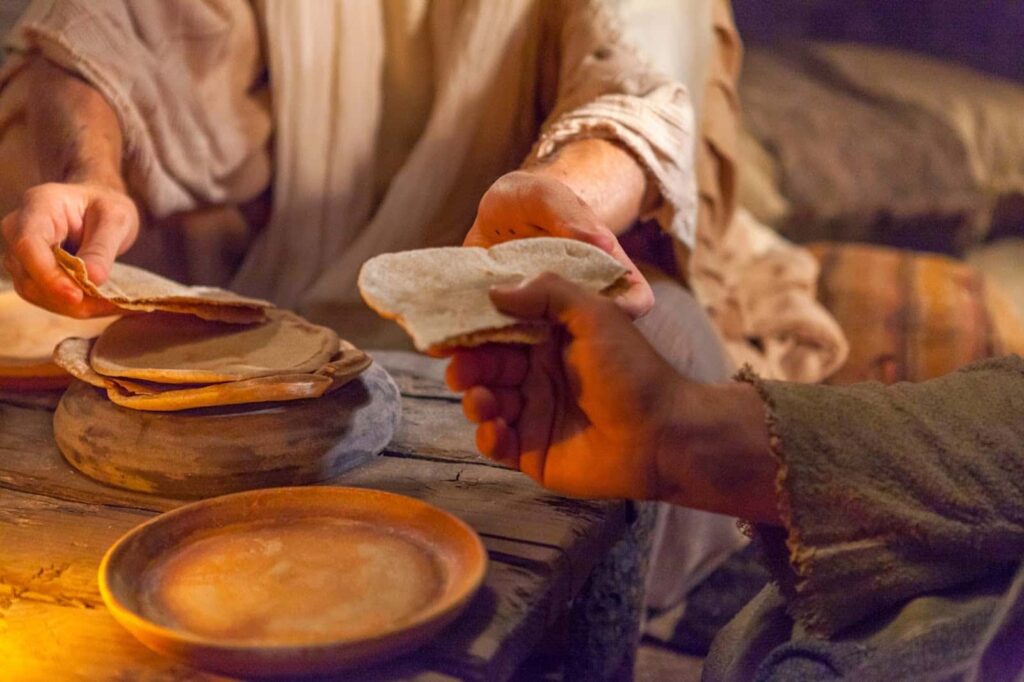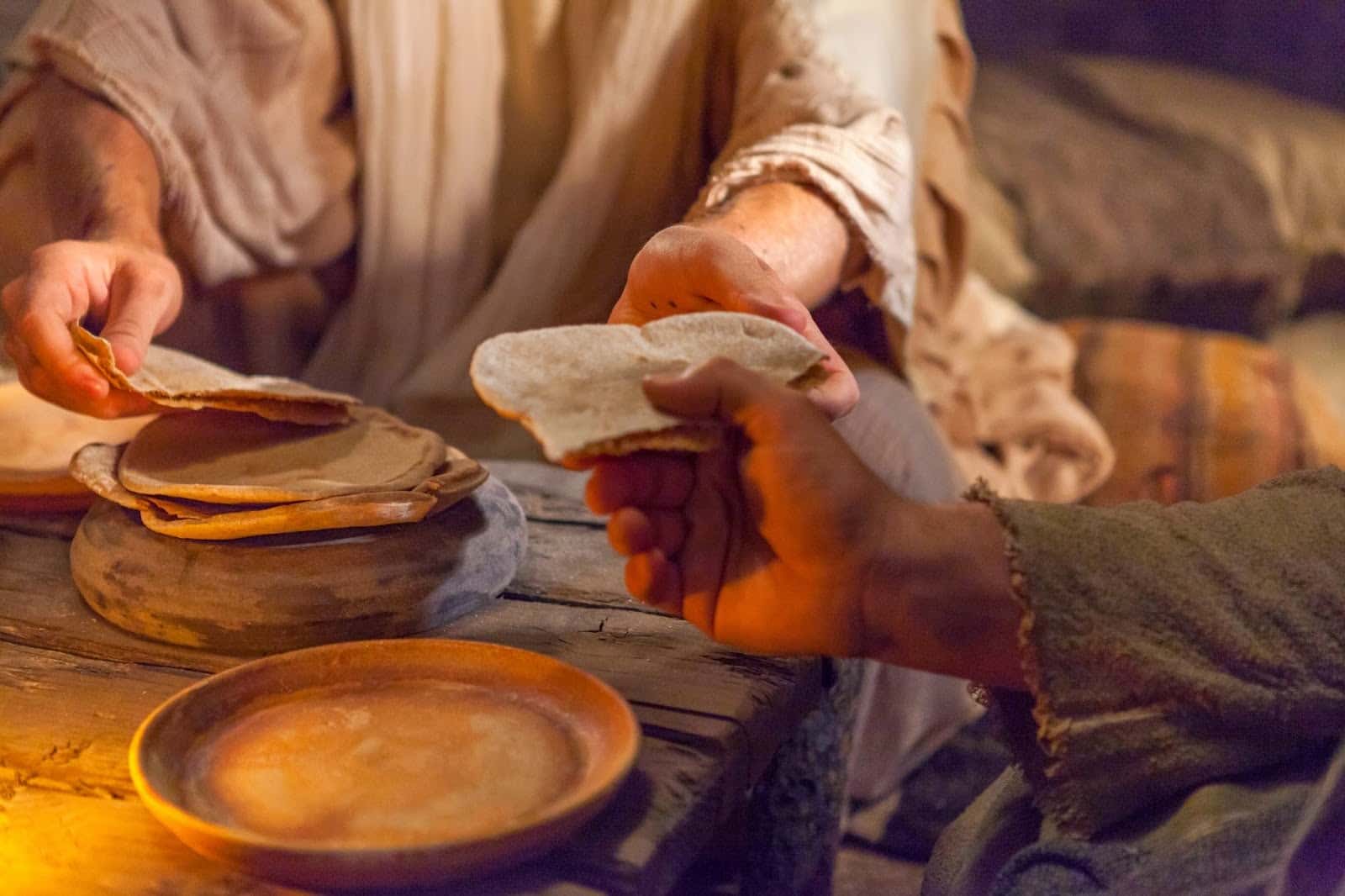
The Breaking of Bread
What does “breaking of bread” mean?
According to Jewish custom, communal meals began with a prayer of praise and thanksgiving to God over a loaf of bread, which was then broken and given to the participants. This “breaking of bread” is a special rite with fraternal and religious significance. The Gospels tell us that Jesus “broke bread” with His disciples, especially at the Last Supper. On the night before He offered Himself as Sacrifice on the Cross, Jesus used the rite of “breaking of bread” when He instituted the Eucharist; it is significant because it is by this action that His disciples recognized Him after His Resurrection, and it is this action that the first Christians used to designate their Eucharistic gatherings. The “breaking of bread” signifies that all who eat the one broken bread, Jesus Christ, enters into communion with Him and forms one body in Him. (cf. CCC 1329)
From its very beginning, the Church has been faithful to the Lord’s command: “Do this in memory of me.” (Luke 22:19) The early Christians in Jerusalem “devoted themselves to the teaching of the apostles and to the communal life, to the breaking of the bread and to the prayers.” (Acts 2:42) (cf. CCC 1342) But it was above all on Sunday, on the first day of the week, which is the day of Jesus’ Resurrection, that the Christians gathered “to break bread.” (cf. Acts 20:7) From that time on, up to today, the “breaking of bread,” which is the celebration of the Eucharist, has been continued so that it can be found everywhere in the Church with the same fundamental structure. (cf. CCC 1343)
The Breaking of Bread in Mass
The Mass is both the Sacrificial Memorial in which the Sacrifice of the Cross is perpetuated, as well as the sacred Banquet of Communion with the Lord’s Body and Blood. The objective of the celebration of the Eucharistic Sacrifice is so that the faithful can have intimate union with Christ through Holy Communion, for to receive Holy Communion is to receive Christ Himself who offered Himself for us. (cf. CCC 1382)
Persons who participate in the “breaking of bread” in Mass by receiving Holy Communion must believe in the Real Presence of Christ in the Eucharist. St. Paul warned: “Anyone who eats and drinks without discerning the body, eats and drinks judgment on himself.” (1 Cor 11:29)
Furthermore, the faithful are obliged to participate in Mass on Sundays and feast days, and to receive the Eucharist at least once a year, if possible during the Easter season. The Church also encourages the faithful to receive Holy Communion on Sundays and feast days, or more often still, even daily. (CCC 1389)
Preparing to receive Holy Communion
Jesus said, “Amen, amen, I say to you, unless you eat the flesh of the Son of Man and drink His blood, you do not have life within you.” (John 6:53) This is an invitation to us from Christ to receive Him in the Sacrament of the Eucharist. (cf. CCC 1384)
In response to this invitation, we must prepare ourselves for so great and so holy a moment. St. Paul urges us to examine our conscience: “Whoever eats the bread or drinks the cup of the Lord unworthily will have to answer for the Body and Blood of the Lord. A person should examine himself, and so eat the bread and drink the cup.” (1 Cor 11:27-28). Therefore, anyone who is conscious of a grave sin must receive the Sacrament of Penance before receiving Holy Communion. (cf. CCC 1385) Persons who receive Holy Communion in the state of mortal sin not only bring judgment on themselves, they also profane the Holy Eucharist in the most grievous manner.
In order to prepare for worthy reception of this sacrament, the faithful should also observe the prescribed Eucharistic fast: according to Canon Law, “one who is to receive the most Holy Eucharist is to abstain from any food or drink, with the exception only of water and medicine, for at least the period of one hour before Holy Communion” (CIC 919 §1). Elderly people, those who are ill, and their caretakers are excused from the Eucharistic fast (CIC 191 §3). In addition, a person’s demeanor and attire ought to convey the respect, solemnity and joy of receiving Christ in the Holy Eucharist. (cf. CCC 1387)
Non-Catholics and Holy Communion
The guidelines for receiving Holy Communion, which are issued by the USCCB, state that “Christians who are not Catholic are welcome to join us in prayer during the Eucharistic liturgy, but are not normally permitted to receive Holy Communion, since they are not in full communion with the Catholic Church.”
Under certain circumstances and with the approval of Church authority, the Eucharist may be given to members of the Eastern Churches (e.g. Eastern Orthodox), because although they are separated from the Catholic Church, they possess the true sacraments by apostolic succession, whereby they are still joined to us in closest intimacy. (cf. CCC 1399)
On the other hand, the ecclesial communities derived from the Reformation and separated from the Catholic Church have not preserved the proper reality of the Eucharistic mystery in its fullness, especially due to the absence of the Sacrament of Holy Orders. It is for this reason that, for the Catholic Church, Eucharistic intercommunion with these communities is not possible. (cf. CCC 1400)
The Fruits of Receiving Holy Communion
- The principal fruit of receiving the Eucharist in Holy Communion is having an intimate union with Christ. Indeed, the Lord said: “Whoever eats my flesh and drinks my blood remains in me and I in him.” (Jn 6:56) (cf. CCC 1391) But in addition, those who receive the Eucharist are united to all the faithful in the One Body of Christ; i.e., in the Church. Receiving the Eucharist renews, strengthens and deepens our incorporation into the Church. (cf. CCC 1396)
- Holy Communion preserves, increases, and renews the life of grace received at Baptism. This growth in Christian life needs the nourishment of the Eucharist, the bread for our pilgrimage until the moment of death. (cf. CCC 1392) The Eucharist strengthens our charity, which tends to be weakened in daily life; and this living charity wipes away venial sins. (cf. CCC 1394)
- The Eucharist also preserves us from future sins, because the more we share the life of Christ and progress in His friendship, the more difficult it is to break away from Him by sinning. (cf. CCC 1395) St. Ambrose said, “As often as His Blood is poured out, if it is poured for the forgiveness of sins, then I should always receive it, so that it may always forgive my sins. Because I always sin, I should always have a remedy.” (cf. CCC 1393)
Questions for reflection:
- How can I improve my participation in Mass?
- How can I explain to others that receiving Holy Communion is not a reward for being “good”?
- Sometimes, I do not feel anything when I receive the Eucharist. Does that mean I am not getting the fruits of receiving Holy Communion?
